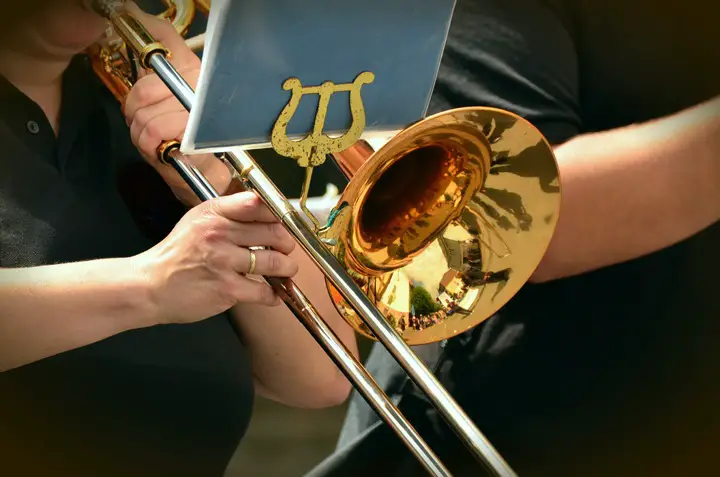Do you have what it takes to be a good trombonist? Some people might say that the best trombonists are born with natural talent, while others might argue that practice and hard work make perfect.
No matter which side of the argument you stand on, there’s no denying that there are some key characteristics of successful trombonists. In this blog post, we’re going to explore what makes a good trombonist and highlight some of the traits that all great players have in common. Stay tuned!
1. Practice
The first factor that makes a good trombonist is practice. It’s important to set aside time each day to practice the instrument, even if it’s just for a short amount of time. This will help you improve your skills and get better at playing the trombone. Additionally, it’s important to find a good teacher or tutor who can help you learn the proper techniques for playing the trombone. With the right practice and instruction, you’ll be well on your way to becoming a great trombonist!
Like with most things in life, the more you practice, the better you’ll become at playing the trombone. If you want to be a good trombonist, you need to put in the hours of practice. You won’t become a master overnight, but if you’re willing to put in the work, you’ll eventually get there.
2. Passion
A musician needs to have a passion for music in order to be successful. Without passion, it’s difficult to endure long hours of practice and rehearsals. The best trombonists are the ones who love playing their instrument and enjoy practicing and performing. When a trombonist has a passion for music, it shows in their playing.
They sound more enthusiastic and excited, and their performances are more dynamic. Passion is an essential quality for any musician, and it’s especially important for trombonists.
3. Patience
Patience is a virtue that is often preached, but not always put into practice. It’s one of those things that we all know we should have, but it’s difficult to actually cultivate. The good news is that patience is something that can be learned and improved over time.
One of the most important things for a trombonist to have is patience. Learning to play the trombone can be frustrating at times, and it’s easy to get discouraged. It’s important to remember that progress takes time, and that every little bit counts. Rome wasn’t built in a day, and neither is your trombone playing.
If you’re patient, you’ll eventually be rewarded with the satisfaction of seeing your hard work pay off. So if you’re feeling frustrated, just remember to be patient and keep at it. Your efforts will eventually be rewarded.
Other important qualities for a trombonist include a strong work ethic, discipline, and focus. While patience is certainly important, it’s not the only thing that determines success. Those who are willing to put in the time and effort to improve their skills will be the ones who ultimately succeed.
4. Good listening skills
A good trombonist is someone who has excellent listening skills. They need to be able to hear the conductor and other instruments and play in harmony with them. They also need to be able to listen to their own playing and make adjustments as needed.
Also, trombonists need to have a good ear for pitch. They need to be able to tune their instrument and play in tune with the other instruments. This is essential for creating a pleasant sound.
5. Strong embouchure
A strong embouchure is key for any trombonist. The embouchure is the way you hold the mouthpiece and lips together to produce a sound on the instrument. It’s important to have a strong embouchure so that you can play loudly and in tune. There are a few things you can do to strengthen your embouchure:
- Practice long tones
- Play with a metronome
- Use a mouthpiece that is the right size for you
If you don’t have a strong embouchure, it’s hard to play in tune and you won’t be able to produce a big sound. That’s why it’s so important to focus on developing a strong embouchure if you want to be a good trombonist.
6. Good Ear
Another important aspect of being a good trombonist is having a good ear. This means being able to hear intervals and chord progressions and being able to play by ear. If you can play by ear, it’s much easier to improvise and write your own music. You can develop your ear by:
- Listening to a lot of music
- Transcribing solos
- Taking ear training courses
If you have a good ear, you’ll be able to play anything that you hear in your head and you’ll be able to improvise easily. This is a valuable skill for any musician, but it’s especially important for trombonists.
7. Good technique
A good trombonist needs to have excellent technique. This includes good understanding of how to use the embouchure and air stream to produce a clean sound, as well as proper hand and finger positioning on the slides. Additionally, a trombonist must be able to play at a wide range of dynamic levels and in many different registers.
This means being able to execute all of the different slurs and articulations that are required of the trombone. It takes a lot of practice to develop good technique, but it’s worth it. When you have good technique, you can play anything that is asked of you and you will sound great doing it.
8. Dexterity and control
Dexterity and control are two of the most important skills for a trombonist. Dexterity is the ability to move your hands and fingers quickly and accurately. Control is the ability to make smooth and precise movements with your hands and fingers.
These skills are important because they allow you to play the trombone with precision and accuracy without them, it would be very difficult to play the trombone correctly.
There are many ways to develop these skills. One way is to practice scales and exercises that require you to move your fingers quickly and accurately. Another way is to play duets or trios with other musicians. This will help you learn how to control your fingers and make precise movements.
9. Agility
Agility is one of the key skills that a trombonist needs in order to be successful. It allows them to move quickly and easily between notes, making it possible to play complex melodies accurately. Agility also helps to create a smooth sound, which is important for playing classical music.
10. Good timing and rhythm
Trombonists need to have good timing and rhythm. This is important for playing in a band or orchestra, as well as for soloing. Good timing and rhythm help to create a sense of groove and swing, which is what makes trombone playing so much fun! A good trombone playing requires a strong sense of rhythm. This means being able to keep a steady beat, as well as playing complex rhythms accurately. A good trombonist needs to be able to play in perfect time with other musicians, and also needs to have a strong sense of how to shape phrases.
Also, trombonists need to have strong lungs in order to play long phrases without running out of breath. They also need to be able to control their breathing, so that they can create a smooth sound.
11. Tone production
Producing a good tone on the trombone is essential for playing the instrument effectively. There are a few key things to keep in mind in order to produce a good tone:
- Keep your embouchure firm. Don’t allow your lips to wobble or collapse inward.
- Make sure your tongue is positioned correctly. The tip of your tongue should touch the back of your teeth, and you should be able to make a “t” sound.
If you can keep these things in mind, you’ll be well on your way to producing a good tone on the trombone!
12. Dedication
Dedication is key to becoming a successful trombonist. You need to be dedicated to practicing and learning your instrument. You also need to be dedicated to your music education and practice regularly. Trombone players who are dedicated to their craft tend to be successful.
13. Strong work ethic
Lastly, good trombonists need to have a strong work ethic. They need to be willing to put in the hours of practice and work hard to improve their skills. Trombone players who are willing to work hard and never give up tend to be the most successful.
14. Articulation
Articulation is another critical element of good trombone playing. This includes both tonguing and slurring. A good trombonist needs to be able to tongue clearly and evenly, with a minimum of extraneous noise. Slurring should be smooth and effortless, without any breaks or glissandos in the sound.
These are just some of the things that make a good trombonist. If you have these skills, then you are well on your way to becoming a great trombone player!
Final Thoughts on What Makes a Good Trombonists
So, what makes a good trombonist? The answer is simple: a combination of all these qualities. Trombonists who have these qualities are the ones who will succeed in the music world. They’re the ones who will go on to play in symphony orchestras, jazz bands, and solo recitals. They’re the ones who will make a career out of playing the trombone.
If you have these qualities, then you have what it takes to be a great trombonist. Start practicing today and see where your passion for music takes you. Who knows, you might just end up being the next great trombonist!
Playing the trombone is a lot of work, and it’s not always easy. If you’re not passionate about it, you’re likely to give up when things get tough. It takes a lot of dedication and passion to be a good trombonist, so make sure you have that before you start.







